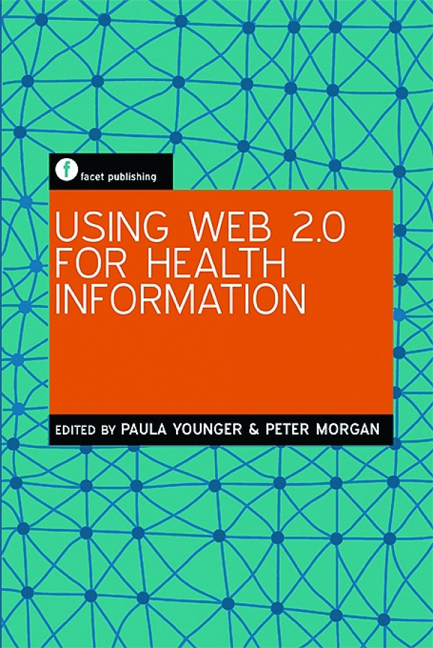Book contents
- Frontmatter
- Contents
- Preface
- Acknowledgements
- Contributors
- Glossary
- Introduction
- Part 1 The basics
- Part 2 Web 2.0 and the implications for health information
- 3 Emerging technologies in health, medical and nursing education
- 4 Supporting learners via Web 2.0
- 5 Supporting research
- 6 Crowdsourcing: the identification of content suitable for the developing world
- 7 Supporting patient needs: an overview of the potential role of Web 2.0 in patient and consumer information
- 8 Some ethical and legal considerations in the use of Web 2.0
- Part 3 Web applications in health information provision: some practical examples
- Part 4 The future
- Index
4 - Supporting learners via Web 2.0
from Part 2 - Web 2.0 and the implications for health information
Published online by Cambridge University Press: 08 June 2018
- Frontmatter
- Contents
- Preface
- Acknowledgements
- Contributors
- Glossary
- Introduction
- Part 1 The basics
- Part 2 Web 2.0 and the implications for health information
- 3 Emerging technologies in health, medical and nursing education
- 4 Supporting learners via Web 2.0
- 5 Supporting research
- 6 Crowdsourcing: the identification of content suitable for the developing world
- 7 Supporting patient needs: an overview of the potential role of Web 2.0 in patient and consumer information
- 8 Some ethical and legal considerations in the use of Web 2.0
- Part 3 Web applications in health information provision: some practical examples
- Part 4 The future
- Index
Summary
Introduction
Public health professionals are responsible for using various forms of media (TV, radio, newspapers, research, the web) to communicate with the public. Use of newer Web 2.0 tools where content can be added, edited or revised, sometimes by many authors, arguably increases the risk of potentially biased or harmful health information. It therefore becomes the public health professional's responsibility to learn the skills needed to critically appraise web content that hasn't gone through the traditional peerreview process. It is important for health professionals and educators to become active participants and contributors to Web 2.0 systems and, moreover, to assist in developing a system and infrastructure that supports educators in successfully incorporating technology into the classroom. This chapter addresses these issues, in particular the use of blogs and wikis in healthcare education.
Web 2.0 in higher education
Higher education is in the midst of a major transformation as it tries to keep up with the impact that new technologies such as Web 2.0 are having upon it. Universities are only at the early stages of coming to terms with the changes technology is creating; however, the expectation from students is that technology will play a major role in their education (Finkelman and Kenner, 2009) – and they're ready for it (Collis and Moonen, 2008)! Institutions of higher education must ensure that educators are on the front line of this ever-changing landscape and have the skills to successfully incorporate information technology into the curriculum.
In the health sciences there have been calls for a systematic revision of the education of healthcare professionals by embedding technology and information-seeking skills into the curriculum (Association of American Medical Colleges, 1998a; Association of American Medical Colleges, 1998b; Association of College and Research Libraries, 2000; Finkelman and Kenner, 2009; Institute of Medicine, 2003; Medical Library Association, 2007; National League for Nursing, 2008; Yasnoff et al., 2001). The health sciences have become an ‘information-processing enterprise’ (Shaw, 2010), reinforcing the need for health professionals to have proficient information technology and information gathering skills.
At present, there is little in the literature systematically reviewing and assessing the use of Web 2.0 in the classroom (Luo, 2010; Skiba and Barton, 2009). At best, it is only ‘slowly’ being incorporated into health and medically related curricula (Kamel Boulos and Wheeler, 2007; Lemley and Burnham, 2009).
- Type
- Chapter
- Information
- Using Web 2.0 for Health Information , pp. 53 - 66Publisher: FacetPrint publication year: 2011



